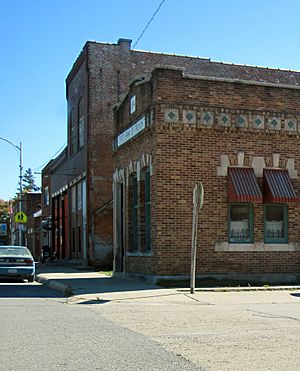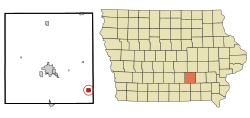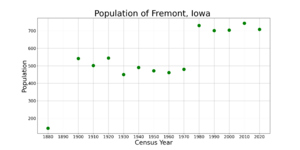Fremont, Iowa facts for kids
Quick facts for kids
Fremont, Iowa
|
|
|---|---|
 |
|

Location of Fremont, Iowa
|
|
| Country | United States |
| State | Iowa |
| County | Mahaska |
| Area | |
| • Total | 1.06 sq mi (2.75 km2) |
| • Land | 1.06 sq mi (2.75 km2) |
| • Water | 0.00 sq mi (0.00 km2) |
| Elevation | 837 ft (255 m) |
| Population
(2020)
|
|
| • Total | 708 |
| • Density | 666.04/sq mi (257.26/km2) |
| Time zone | UTC-6 (Central (CST)) |
| • Summer (DST) | UTC-5 (CDT) |
| ZIP code |
52561
|
| Area code(s) | 641 |
| FIPS code | 19-29190 |
| GNIS feature ID | 2394824 |
Fremont is a small city located in Mahaska County, Iowa, in the United States. It is a quiet community with a history linked to early American settlement and railroads. In 2020, the city had a population of 708 people.
Contents
History of Fremont
Early Days in Fremont
In 1871, Fremont was a growing town. Its main street, called Main Street, stretched for about half a mile. There were houses on almost every block. You could also find a Baptist church, a hotel, and three stores.
The town had a barber shop and a school. People living there could get help from a doctor. There was also a blacksmith to work with metal and a shoemaker to fix shoes.
Railroads Arrive in Fremont
Two different railroad companies built tracks near Fremont. These were the Burlington and Western Railway and the Iowa Central Railway. They both built tracks heading towards Oskaloosa, Iowa.
The Burlington and Western arrived in 1883. Its tracks were originally "narrow gauge," meaning they were closer together than standard tracks. In 1902, these tracks were made wider to "standard gauge." The Chicago, Burlington and Quincy Railroad took over this line the next year.
Around the same time, the Minneapolis and St. Louis Railway took over the Iowa Central line. The Burlington line was no longer used after 1934.
Fremont in the Early 1900s
By 1905, Fremont had important buildings for farming and trade. There was a grain elevator to store crops. There were also live-stock pens for animals. A lumber yard was near the Burlington train station.
On the other side of town, near the Iowa Central station, there was a creamery. This was a place where dairy products were made. There was also another stockyard and grain elevator. The school and hotel were still on Main Street. The post office was just a short walk north of Main Street.
Geography of Fremont
Fremont is located in Iowa. The city covers a total area of about 1.03 square miles (2.75 square kilometers). All of this area is land, meaning there are no large bodies of water like lakes or rivers within the city limits.
Population of Fremont
| Historical populations | ||
|---|---|---|
| Year | Pop. | ±% |
| 1880 | 143 | — |
| 1900 | 542 | +279.0% |
| 1910 | 501 | −7.6% |
| 1920 | 544 | +8.6% |
| 1930 | 450 | −17.3% |
| 1940 | 490 | +8.9% |
| 1950 | 471 | −3.9% |
| 1960 | 461 | −2.1% |
| 1970 | 480 | +4.1% |
| 1980 | 730 | +52.1% |
| 1990 | 701 | −4.0% |
| 2000 | 704 | +0.4% |
| 2010 | 743 | +5.5% |
| 2020 | 708 | −4.7% |
| Source: and Iowa Data Center Source: |
||
Fremont's Population in 2020
According to the 2020 United States Census, 708 people lived in Fremont. There were 285 households, which are groups of people living together. Out of these, 194 were families.
Most people in Fremont were White, making up about 96% of the population. A small number of people were Black or African American, Native American, or from two or more races. About 2.4% of the population was Hispanic or Latino.
The average age in Fremont was about 38.9 years old. About 26.4% of the people were under 20 years old. About 16.4% were 65 years old or older. Slightly more than half of the population (52.4%) was male.
Fremont's Population in 2010
In the 2010 United States Census, Fremont had 743 people. There were 300 households and 208 families. The city's population density was about 721 people per square mile.
Most residents (98.7%) were White. A small number were African American or Asian. About 0.4% of the population was Hispanic or Latino.
About 33% of households had children under 18 living with them. The average age in the city was 37.5 years. About 26.6% of residents were under 18 years old. About 16% were 65 years or older.
Education in Fremont
Fremont is part of the Eddyville–Blakesburg–Fremont Community School District. This school district was created in 2012. It happened when the Fremont Community School District joined with the Eddyville–Blakesburg Community School District.
Notable People from Fremont
Fremont has been home to some interesting people:
- Steve Bales – He was a flight control engineer for NASA. He worked on the famous Apollo 11 mission, which was the first time humans landed on the Moon.
- Ivan Combe – He founded a company called Combe, Inc. This company created well-known products like Clearasil and Odor Eaters. He was a leader in the health care product industry.
- Herschel C. Loveless – He served as the 34th Governor of Iowa.
See also
 In Spanish: Fremont (Iowa) para niños
In Spanish: Fremont (Iowa) para niños
 | Selma Burke |
 | Pauline Powell Burns |
 | Frederick J. Brown |
 | Robert Blackburn |


